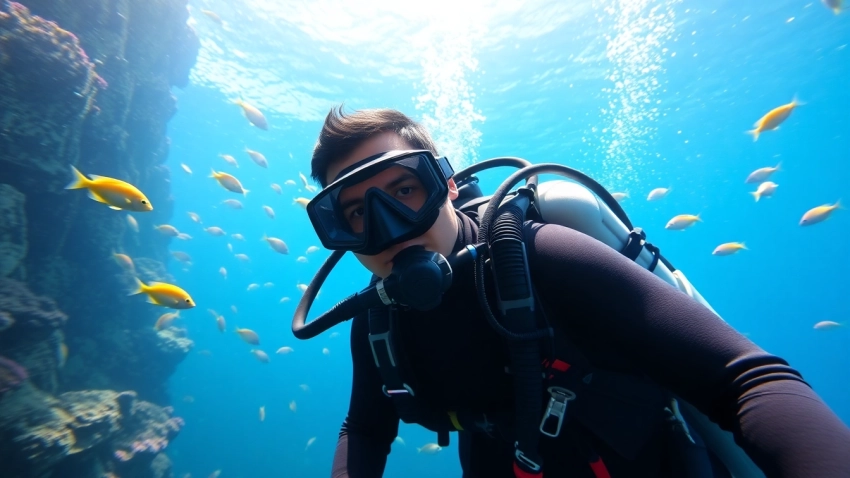
Comprehensive Guide to Bali Diving Course: Enhance Your Underwater Experience
Introduction to Bali Diving Course
Bali, Indonesia, is renowned for its stunning marine biodiversity and vibrant coral reefs, making it a top destination for diving enthusiasts around the world. Whether you are a novice eager to explore the underwater beauty or an experienced diver seeking to enhance your skills, taking a Bali diving course can significantly enrich your diving experience. This guide will walk you through all the essential aspects of diving courses available in Bali, ensuring that you are well-informed before you take the plunge.
Understanding the Basics of Diving
Before diving into the specifics of courses and certifications, it’s essential to grasp the fundamentals of diving. Scuba diving allows you to explore underwater environments while being equipped with necessary gear, including tanks, regulators, and diving suits. Understanding the basics helps prepare beginners for a safe and enjoyable experience. Key concepts to familiarize yourself with include:
- Buoyancy: Learning how to control your buoyancy is fundamental for an enjoyable diving experience. Proper buoyancy control allows divers to hover effortlessly and avoid damage to delicate marine life.
- Equalization: This refers to the technique of balancing the pressure in your ears as you descend underwater. Mastering equalization is crucial for preventing ear injuries.
- Dive Planning: A crucial part of diving includes planning your dive, which involves understanding the dive site, outlining safety measures, and ensuring that you have enough air for your adventure.
The Importance of Certification in Bali
Certification is vital when it comes to diving. Without proper training and accreditation, not only can diving be risky, but it can also prevent you from accessing certain dive sites that require certified divers. Bali offers several internationally recognized diving certifications, primarily through the Professional Association of Diving Instructors (PADI). These certifications ensure that divers are trained in safety protocols, equipment usage, and emergency responses, allowing for a safer diving environment.
Overview of Common Dive Packages
Typically, Bali diving courses come in several packages that cater to different levels of experience:
- Discover Scuba Diving: Ideal for beginners, this course provides a brief introduction to scuba diving without requiring a lengthy commitment.
- PADI Open Water Diver Course: This is a comprehensive 3-4 day course that covers theoretical knowledge and practical underwater skills, culminating in certification.
- Advanced Open Water Diver Course: This course is designed for certified divers who wish to enhance their skills through deeper dives and specialty training, such as navigation or night diving.
Choosing the Right Bali Diving Course
Different Levels of Diving Courses
Diving courses in Bali are typically categorized into various levels based on experience. Understanding these levels is essential for selecting the right course for your needs:
- Beginner Courses: Options like the Discover Scuba Diving or Open Water Diver Course are available for those new to the sport.
- Intermediate Courses: Courses such as the Advanced Open Water Diver can help divers improve their skills and confidence.
- Professional Courses: For those looking to advance their careers in diving, instructor training and specialties like Deep Diver or Dive Master are available.
Factors to Consider When Selecting a Course
When selecting a diving course, consider the following factors:
- Your Experience Level: Choose a course that aligns with your current skill set and comfort level.
- Course Content and Duration: Different courses have varying curricula and time commitments, so ensure you select one that fits your schedule.
- Instructor Qualifications: Research the credentials of the instructors and the reputation of the diving school offering the courses.
Course Duration and Schedules
Typically, the duration of diving courses in Bali ranges from a half-day for introductory sessions to several days for comprehensive certification. Understanding course schedules and knowing how each course fits into your itinerary can greatly enhance your diving experience. For example, while the Discover Scuba Diving course may last just a few hours, the PADI Open Water Diver program requires two to four days to complete, ensuring that participants receive adequate training.
What to Expect from a Bali Diving Course
Skills and Techniques Taught
A Bali diving course will cover essential skills that are critical for a safe diving experience. These include:
- Basic Diving Skills: Such as floating, equalizing, and using diving equipment.
- Emergency Procedures: Learning how to handle potential issues underwater, such as equipment malfunctions or unexpected ascents.
- Environmental Awareness: Gaining insights into marine ecosystems and how to protect them, including not touching coral or disturbing wildlife.
Equipment and Safety Protocols
Safety in scuba diving cannot be overstated. A quality diving course provides knowledge about the different types of diving equipment, such as:
- Mask and Snorkel: Understanding how to use these for surface swimming and underwater exploration.
- Regulator: Learning how to use a regulator to breathe from your tank effectively.
- Wetsuit and BCD: Understanding the purpose of thermal protection and buoyancy control devices.
Environmental Awareness and Marine Conservation
A crucial part of any diving course is learning about marine conservation. Divers are often the first line of defense against environmental threats facing marine ecosystems. Training courses emphasize:
- The impacts of pollution and overfishing on marine life.
- The importance of reef protection and sustainable diving practices.
- Appropriate behavior and conservation initiatives divers can participate in.
Cost and Value of Bali Diving Course
Typical Pricing for Various Courses
The cost of diving courses in Bali can vary significantly based on the type of course, duration, and included materials. On average, you can expect to pay:
- Discover Scuba Diving: Approximately $100 to $150.
- PADI Open Water Diver Course: Ranging from $300 to $500, which may include equipment and materials.
- Advanced Open Water Diver Course: Price can range from $250 to $400, depending on the number of dives included.
Cost-Effective Packages and Promotions
Several dive centers in Bali offer promotional packages that can make diving more affordable. Consider looking for:
- Group Discounts: Many schools offer reductions for groups or families booking together.
- Combination Packages: Some dive centers bundle courses with additional activities such as snorkeling or island tours.
- Off-Peak Discounts: If you are flexible, diving during the low season can lead to significant savings.
Understanding Value Beyond Pricing
While the cost is essential, it is also important to consider the value you receive from your diving course. Factors such as:
- Quality of Instruction: The expertise and teaching style of the instructors can significantly impact your learning experience.
- Safety Standards: Ensure the diving school adheres to strict safety protocols.
- Reputation and Reviews: Check reviews and testimonials to gauge the overall experiences of previous students.
Frequently Asked Questions about Bali Diving Course
Common Concerns for Beginners
Many beginners often have concerns about safety and their ability to handle scuba diving. Common questions include:
- Is diving safe? Yes, when conducted under proper guidance and following safety protocols.
- What if I have a fear of underwater spaces? Take it slow, and consider starting with a Discover Scuba Diving course, which is tailored for beginners.
- Do I need to be a strong swimmer? While swimming skills are helpful, most courses teach the necessary skills for those who may not be confident swimmers.
Frequently Encountered Misconceptions
There are various misconceptions surrounding diving courses. A few notable ones include:
- Myth: You have to be fit to dive. While fitness can be beneficial, many courses accommodate various fitness levels.
- Myth: Diving is mainly for vacationers. In reality, many divers make diving a lifestyle or career choice.
- Myth: Diving is an expensive hobby. While there are costs, many affordable options allow you to dive on a budget.
Tips for First-Time Divers
As a first-time diver, the following tips can enhance your experience:
- Choose the Right Instructor: Make sure your instructor has good reviews and proper accreditation.
- Stay Relaxed: Relaxation is crucial; clear your mind and focus on breathing.
- Ask Questions: Don’t hesitate to ask your instructor anything you are unsure about.












Leave a Reply